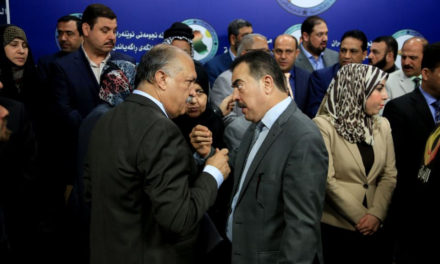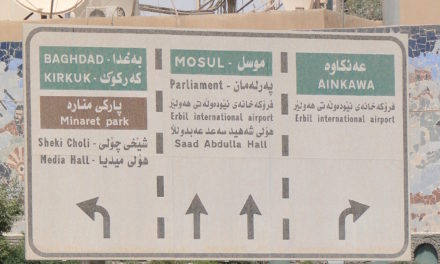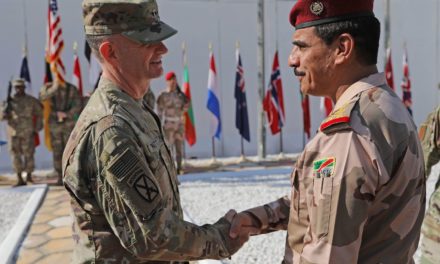I wrote last month on the Kurdistan Region’s incumbent president Masoud Barzani’s need to deliver on returning the goodwill and alliance prime minister Haider al-Abadi extended to him on his trip to Baghdad in late September. Abadi spoke largely on a united federal Iraq and avoided any criticism of Barzani’s devisive politics in Erbil or his overdue presidential mandate of the Kurdistan Region.
The visit was a good trip for photo ops from a federal Iraq PR perspective, but it didn’t stop Barzani from putting his relationship with Ankara ahead of Baghdad. Military plans on the Mosul Offensive were seen in the possession of Turks in what was later revealed to have been leaked to them by Barzani after it was shared with him and the Kurdish forces by Baghdad. It also caused Abadi to delay his announcement of the Mosul Offensive because Erdogan in Ankara and Barzani in Erbil thought it was their right or duty to announce the offensive before the Commander in Chief of Iraq does so.
The delay was not only due to the leaked military plans and inexcusable announcements from Erdogan and Barzani to announce the military campaign to liberate Mosul; Barzani’s illegal request to have Turkey station its troops in sovereign Iraqi land to train Kurdish forces and the Turkish proxy militia, the Sons of Nineveh also caused a delay in Abadi’s announcement. Not only did it postpone the offensive, but created a war of words between Abadi and Erdogan that has escalated to military threats. These threats have pushed Erdogan to send more troops to the Turkish-Iraqi border while Barzani remains quiet in between. To add insult to injury, the Turkish troops stationed to train in Iraq at the request of Barzani are not even stationed within the borders of the Kurdistan Region, but are illegally occupying land in Iraq’s Nineveh province.
Some may argue that Barzani has returned the favor by holding joint press conferences on the front lines of Mosul with statements marking the historic moment of Iraqi Security Forces fighting alongside Kurdish Peshmerga forces for the first time. However, such statements hold little value when Barzani continues to claim there is no political agreement between him and Abadi’s government on post-liberation Mosul and the vast areas Kurdish forces have taken control of outside the Kurdistan Region’s borders. This goes back to the fear that many politicians in Baghdad raised when military operations to defeat ISIL began. Will the Kurdish forces take part in defeating ISIL, and if so, will they cooperate in returning liberated land that belongs to Iraq? While it took the Kurdistan Regional Government (KRG) two months and the threat of Erbil falling to ISIL for Kurdish forces to take part in defeating ISIL, they’re showing no sign of cooperating in returning administrative control to the rightful government.
This is a very concerning moment for Iraq as the “disputed lands” mentioned in Iraq’s constitution were meant to be solved through a free and fair referendum. This is a sentiment shared by most in Iraq, but the notion to have a referendum has been delayed constantly because Iraq has not held a census since the late 1980s. Most figures are based on rations card distributions and election results. However, these do not constitute adequate substitutions for a census and one needs to be held. There have been many delays from the KRG over a census due to the fear that actual demographics could indicate they do not hold the numbers they claim in both disputed areas and in their own region that determines the percentage the KRG receives from Iraq’s federal budget. This is no excuse for delaying a census and therefore Barzani’s claims of disputed areas being decided by “blood” instead of a census and referendum is unacceptable.
Kurdish soldiers are not the only ones to sacrifice their lives in defeating ISIL. Unlike the Kurdish forces, the lives of Iraqi Security Forces have not been used for political reasons like expanding KRG territory. Iraqi forces have given their lives to rid Iraq of ISIL and free fellow Iraqis from its oppressive rule, not to change demographics and territorial rule of liberated cities and towns. This is a fundamental difference that must be acknowledged. Prime minister Abadi has tried to play the unifying role of claiming all Iraqis are fighting together to free Iraq of ISIL, constantly emphasizing the cooperation of Iraqi Security Forces and Kurdish forces in Mosul Offensive. However, this leaves himself and Iraq vulnerable if Barzani refuses to hand back any land. Iraq will lose a chunk of its own territory to the Kurdistan Region and Abadi will be held accountable for these losses, overshadowing his eventual achievement of ridding Iraq of ISIL.
During Abadi’s weekly press conference on November 8, the prime minister was asked about Kurdish statements of retaining liberated areas. Abadi’s response was that such statements are not in line with the agreements held with the KRG. It is promising that Abadi refuses these statements and cites agreements with Kurdish leaders guaranteeing the return of Iraqi land, but his response pales in comparison to the numerous times Kurdish leaders claimed to keep the land they liberated. Abadi needs to be more decisive with regards to disputed land as Mosul nears its liberation.
If Barzani refuses to return liberated land back to Iraq and only use Abadi temporarily to survive the Kurdish political divide, he will eventually come out on top as “returning Kurdish land back to Kurdistan Region” after ISIL is defeated and will no longer need Abadi’s backing. In such an outcome, Abadi will have been played for a fool at Barzani’s weakest moment.

Hamzeh Hadad
Hamzeh Hadad is an Iraqi writer and commentator. He holds a Bachelor of Arts with honours from the University of King’s College.










